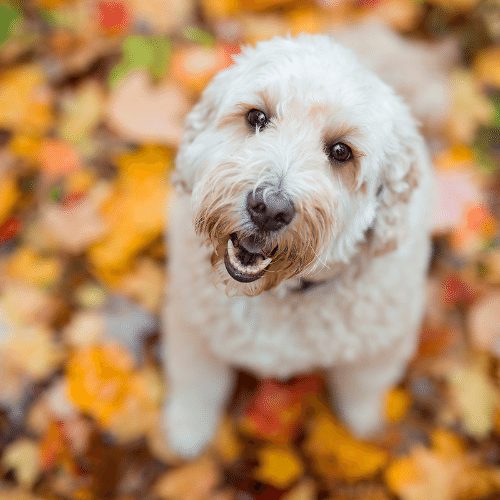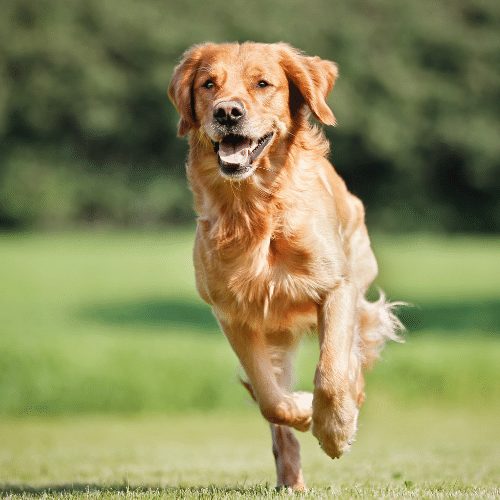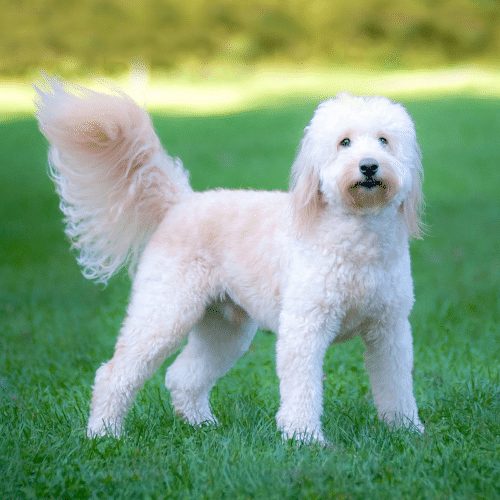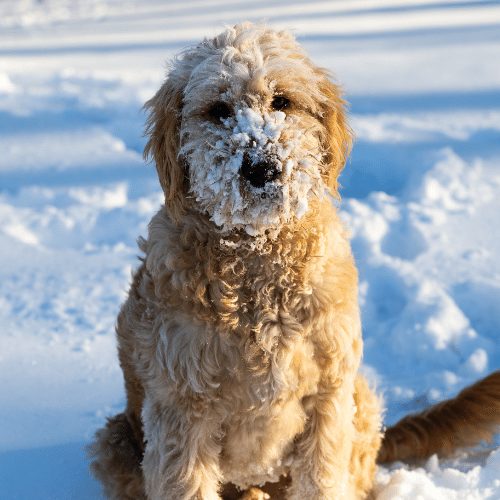Goldendoodle
May 26, 2021 2021-08-02 8:26Table of Contents

Origin and History of the Goldendoodle
Goldendoodles are the most popular breed of Doodle dog. They started to become very popular in the 1990s and quickly spread all over the Western world. Before being bred as a companion dog however, Goldendoodles had a task with a lot of responsibility: They first originated in 1969 as specifically bred guide dogs for the blind. Once breeders realized what an amazing cross they had produced, Goldendoodles quickly became a popular breed choice in many countries.
A cross of the loyal, outgoing and social Golden Retriever and the non-shedding, highly intelligent Poodle, Goldendoodles combine the qualities of both parents into a perfect package. They are smart, energetic and love to be around people.
There are several sub-breeds of these dogs, such as the Mini Goldendoodle or the F1b Mini Goldendoodle.
Who invented the Goldendoodle?
It is not entirely clear who exactly came up with the idea of the Goldendoodle. However, we do know the inventor of their cousin, the Labradoodle: Labradoodles were first bred by Australian Wally Conron.
He was a breeder of guide dogs for the blind and was approached by a blind woman whose husband was allergic to the traditional guide dog choice back then, the Labrador. Conron had the idea to cross a Labrador with a Poodle to combine the one retriever’s biddable biddable nature with the low-shedding qualities of the Poodle.

Poodles
Poodles originally were bred in Germany as water retrievers. While they look fancy and dainty, the original Standard Poodle was a hard-working, tireless assistant to hunters. Their curly coat was specifically developed to do well when wet for many hours.
Poodles are extremely intelligent dogs that can have a slightly nervy side to them. They have a lot of energy and require daily mental and physical exercise. A Poodle is no couch potato dog!
Poodles come in three size varieties: the Standard Poodle, the Miniature Poodle and the Toy Poodle. Standard Golden Retrievers are used in breeding Goldendoodles. Miniature and Toy Poodles are the parents and grandparents of Mini Goldendoodles and F1b Mini Goldendoodles.
Golden Retrievers
Golden Retrievers are highly popular companions dogs all across the planet. Their outgoing temperament, always happy mood and love for people makes them a perfect breed for everyone who wants a loyal canine by their side.
Golden Retrievers were originally bred in the mid-1800s in Scotland. Hunting was a popular pastime of the wealthy nobles. Because the all-around hunting dogs that were used did not excel at retrieving birds from water, the decision was made to breed a specific water retriever.
The Golden has since spread all around the world and is only rarely used in hunting these days. Instead, Golden Retrievers are perfect companion dogs that also thrive when engaged in a variety of dog sports, such as obedience, agility or flyball. In England, the variety of the English Cream Retriever has become a highly popular pet.
They retained a love for water and fetching from their original breed purpose!


Appearance
Especially in first-generation Goldendoodles there is a lot of variety in looks. Every cross-breed can show the parents’ qualities in different ways – there will be some Goldendoodles that look more like Poodles and others that are more like the Golden parent. Every Goldendoodle is a surprise package!
Goldendoodles are large dogs, standing 20-26 inches tall and weighing anywhere form 40-90 lbs. (If you want to know how tall exactly your Goldendoodle will get, check out our Goldendoodle growth chart/adult weight calculator!)
They mostly come in different shades of red, though they can also be a very light cream color.
Their coat is curly or wavy and long if not cut regularly. They have floppy ears and brown eyes. Their long, beautiful tail is pretty much always wagging!
Temperament of the Goldendoodle
As a typical Doodle, your Goldendoodle will be a boisterous, happy-go-lucky companion who is always up for new adventures. Goldendoodles are highly active dogs that absolutely require an outlet for their energy every day.
They love any kind of social interaction – this can be snuggling on the couch, tagging along to a barbecue or playing at the park – and will always be ready to make more friends!
Goldendoodles typically get along very well with other dogs. As with all dogs however, it is important to socialize them early on in their life to prevent future reactivity. Goldendoodles should not play with very small dogs, as they size and energy level can become dangerous for little ones like the Shorkie.
Goldendoodles stay puppies for many years. Do not expect your dog to be grown-up and mature by the time he reaches his first birthday. Even a 5 year old Goldendoodle can be as silly and wild as a 5 month old. They require a lot of chews and toys and want to be entertained for several hours a day. Unfortunately, this breed often suffers from intestinal blockages as a result of ingesting destroyed toys.
If you do not want a dog who will be a goofball all his life, the Goldendoodle is not for you!


Are Goldendoodles good family dogs?
Goldendoodles are not necessarily the best family dogs. It will come down to how much time and effort you want to put into working with, exercising and training your Goldendoodle.
For families that are very busy they are not a good fit. If both parents work late or the kids already have a bunch of activities, do not get a Goldendoodle.
Goldendoodles are not just goofy-looking big teddybears. They are high-energy dogs with working-bred parents and they can and will be destructive unless you invest a considerable amount of time and effort into training and exercising them (both mentally and physically!).
Families should only commit to a Goldendoodle if they can exercise and train the dog every day, for the 12+ years of his life.
Do Goldendoodles attach to one person?
Goldendoodles will attach themselves closely to their family members. They however are not typical one-person dogs such as many herding dogs like the Heeler or Australian Shepherd. A Goldendoodle is not picky in how many friends he has!
It is important that all family members work with a Goldendoodle on his basic training. Like all dogs, Goldendoodles will listen the best to the person that they have the longest training history with. Ideally every family member should train with the Goldendoodle at least once or twice a week. The more your Goldendoodle rehearses listening to each family member – also kids – the better his overall manners will become.
Why are Goldendoodles so crazy?
Many Goldendoodle owners are surprised at the intense levels of energy their dog has. An excited Goldendoodle is a big fluffy mess trying to simultaneously lick your face, jump in your lap, make you throw his ball and scratch his tummy. The high activity needs of a Goldendoodle can become problematic for many first time dog parents who are not prepared for such an intense companion.
It needs to be clear that a Goldendoodle is not a sleepy teddybear. In fact, your Goldendoodle comes from two working-bred parents. Both Poodles and Golden Retrievers originally were developed to tirelessly retrieve game, through long hours, in hot and in cold weather, without quitting or even showing signs of exhaustion. While the offspring do not need to go hunting with us anymore, they still possess the energy level required!
If you are retired, if you are looking for a calm lap dog or if you do not have a lot of time to devote to your dog every day – think twice about getting a Goldendoodle.
Be prepared for a whole lot of furry energy if you get one!


Grooming Goldendoodles
Many owners decide for the Goldendoodle because of his low-shedding qualities. While it is true that Goldendoodles shed less than a regular double-coated Golden retriever, this does not mean that they do not require grooming.
Their curly Poodle coat comes with its own set of challenges and grooming needs. You need to brush your Goldendoodle at least once or twice a week to prevent matting. He should also be bathed once a month and have his nails clipped regularly.
The Goldendoodle’s coat will grow very long if not clipped. Most owners choose to keep their Goldendoodle in a short cut. A groomer in your area can help you come up with a suitable haircut schedule. This cutie on the left just came back from getting clipped!
Do Goldendoodles shed?
One of the main reasons why many owners choose to get any Doodle cross is the no-shedding quality.
It is important to be clear that there is no guarantee that your dog will be non-shedding. While he will shed less, it is impossible to say how much less exactly.
If you want a Goldendoodle because you don’t like dog hair lying around the house, the low-shedding qualities will work. They do not blow their coat and you will definitely never find clumps of hair lying around.
If you however have any kind of dog allergy, you need to spend some time around Goldendoodles first to determine if their coat and skin will trigger an allergic response.
Many Goldendoodles are rehomed every year because the owners acquired them falsely believing they would be completely hypo-allergenic.


How much do Goldendoodles cost?
If you are looking for a cheap dog, the Goldendoodle unfortunately doesn’t fit the bill. Most breeders charge between $1,500 and $3,000 for puppies. The price will heavily depend on the reputation of the breeder and how sought-after the specific puppies are. Many breeders charge higher prices for a certain color or coat type, as well as the generation of the breeding.
Because Goldendoodles are so popular and often get surrendered in their first year because of too high energy levels, you might have luck finding a Goldendoodle through a local rescue. There also are specific Goldendoodle rescues that can help you find a dog. These rescues Goldendoodles will typically cost around $300 – including spay/neuter, microchip and shots.

